Reflective Report on Group Work - OB in International Context
VerifiedAdded on 2023/01/11
|5
|1293
|20
Report
AI Summary
This reflective report analyzes a student's experience in group work within an 'Organisational Behaviour in an International Context' module, focusing on the application of Tuckman's team development model. The report details the student's personal experiences across the forming, storming, norming, performing, and adjourning phases, highlighting challenges such as differing skill levels and expectations among team members. The student reflects on their role, including efforts to support less experienced members and the emotional impact of perceived lack of contribution. Key learnings include the importance of clear agreements, managing expectations, fostering communication, and maintaining transparency to facilitate effective teamwork. The report emphasizes how understanding group dynamics and adapting communication strategies are crucial for success in professional environments. The student concludes with insights gained from the reflection process and implications for future group projects.
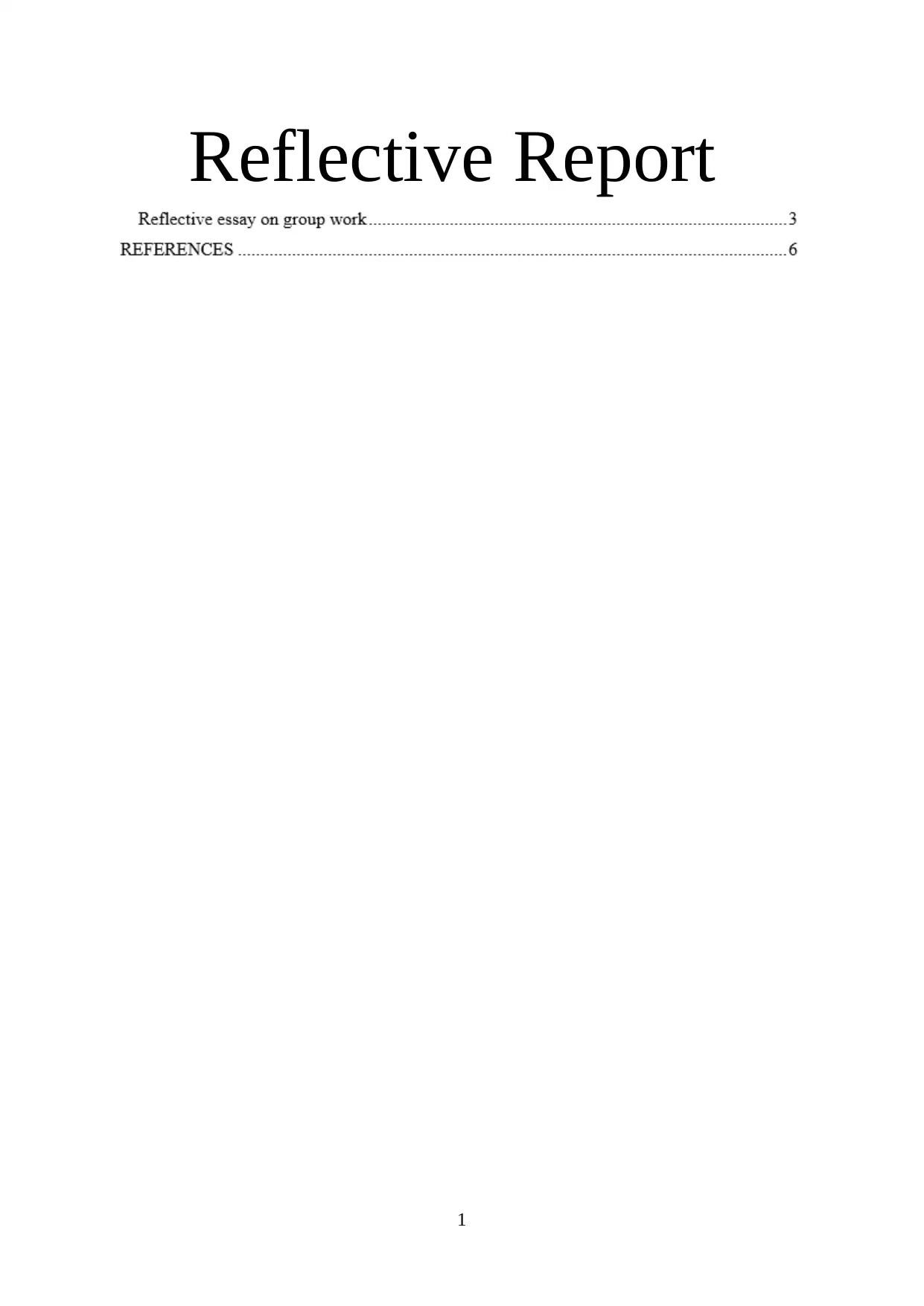
Reflective Report
1
1
Paraphrase This Document
Need a fresh take? Get an instant paraphrase of this document with our AI Paraphraser
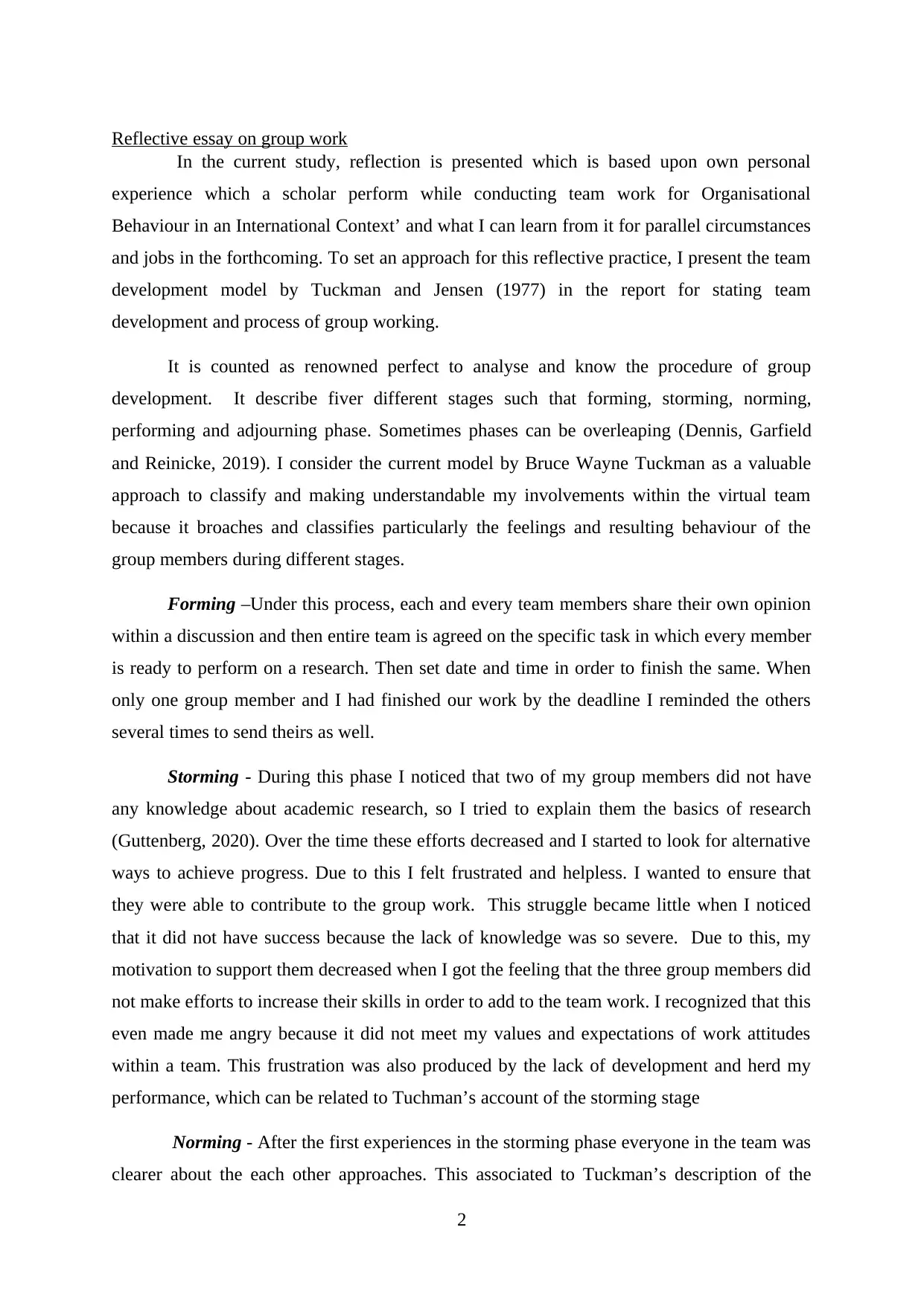
Reflective essay on group work
In the current study, reflection is presented which is based upon own personal
experience which a scholar perform while conducting team work for Organisational
Behaviour in an International Context’ and what I can learn from it for parallel circumstances
and jobs in the forthcoming. To set an approach for this reflective practice, I present the team
development model by Tuckman and Jensen (1977) in the report for stating team
development and process of group working.
It is counted as renowned perfect to analyse and know the procedure of group
development. It describe fiver different stages such that forming, storming, norming,
performing and adjourning phase. Sometimes phases can be overleaping (Dennis, Garfield
and Reinicke, 2019). I consider the current model by Bruce Wayne Tuckman as a valuable
approach to classify and making understandable my involvements within the virtual team
because it broaches and classifies particularly the feelings and resulting behaviour of the
group members during different stages.
Forming –Under this process, each and every team members share their own opinion
within a discussion and then entire team is agreed on the specific task in which every member
is ready to perform on a research. Then set date and time in order to finish the same. When
only one group member and I had finished our work by the deadline I reminded the others
several times to send theirs as well.
Storming - During this phase I noticed that two of my group members did not have
any knowledge about academic research, so I tried to explain them the basics of research
(Guttenberg, 2020). Over the time these efforts decreased and I started to look for alternative
ways to achieve progress. Due to this I felt frustrated and helpless. I wanted to ensure that
they were able to contribute to the group work. This struggle became little when I noticed
that it did not have success because the lack of knowledge was so severe. Due to this, my
motivation to support them decreased when I got the feeling that the three group members did
not make efforts to increase their skills in order to add to the team work. I recognized that this
even made me angry because it did not meet my values and expectations of work attitudes
within a team. This frustration was also produced by the lack of development and herd my
performance, which can be related to Tuchman’s account of the storming stage
Norming - After the first experiences in the storming phase everyone in the team was
clearer about the each other approaches. This associated to Tuckman’s description of the
2
In the current study, reflection is presented which is based upon own personal
experience which a scholar perform while conducting team work for Organisational
Behaviour in an International Context’ and what I can learn from it for parallel circumstances
and jobs in the forthcoming. To set an approach for this reflective practice, I present the team
development model by Tuckman and Jensen (1977) in the report for stating team
development and process of group working.
It is counted as renowned perfect to analyse and know the procedure of group
development. It describe fiver different stages such that forming, storming, norming,
performing and adjourning phase. Sometimes phases can be overleaping (Dennis, Garfield
and Reinicke, 2019). I consider the current model by Bruce Wayne Tuckman as a valuable
approach to classify and making understandable my involvements within the virtual team
because it broaches and classifies particularly the feelings and resulting behaviour of the
group members during different stages.
Forming –Under this process, each and every team members share their own opinion
within a discussion and then entire team is agreed on the specific task in which every member
is ready to perform on a research. Then set date and time in order to finish the same. When
only one group member and I had finished our work by the deadline I reminded the others
several times to send theirs as well.
Storming - During this phase I noticed that two of my group members did not have
any knowledge about academic research, so I tried to explain them the basics of research
(Guttenberg, 2020). Over the time these efforts decreased and I started to look for alternative
ways to achieve progress. Due to this I felt frustrated and helpless. I wanted to ensure that
they were able to contribute to the group work. This struggle became little when I noticed
that it did not have success because the lack of knowledge was so severe. Due to this, my
motivation to support them decreased when I got the feeling that the three group members did
not make efforts to increase their skills in order to add to the team work. I recognized that this
even made me angry because it did not meet my values and expectations of work attitudes
within a team. This frustration was also produced by the lack of development and herd my
performance, which can be related to Tuchman’s account of the storming stage
Norming - After the first experiences in the storming phase everyone in the team was
clearer about the each other approaches. This associated to Tuckman’s description of the
2
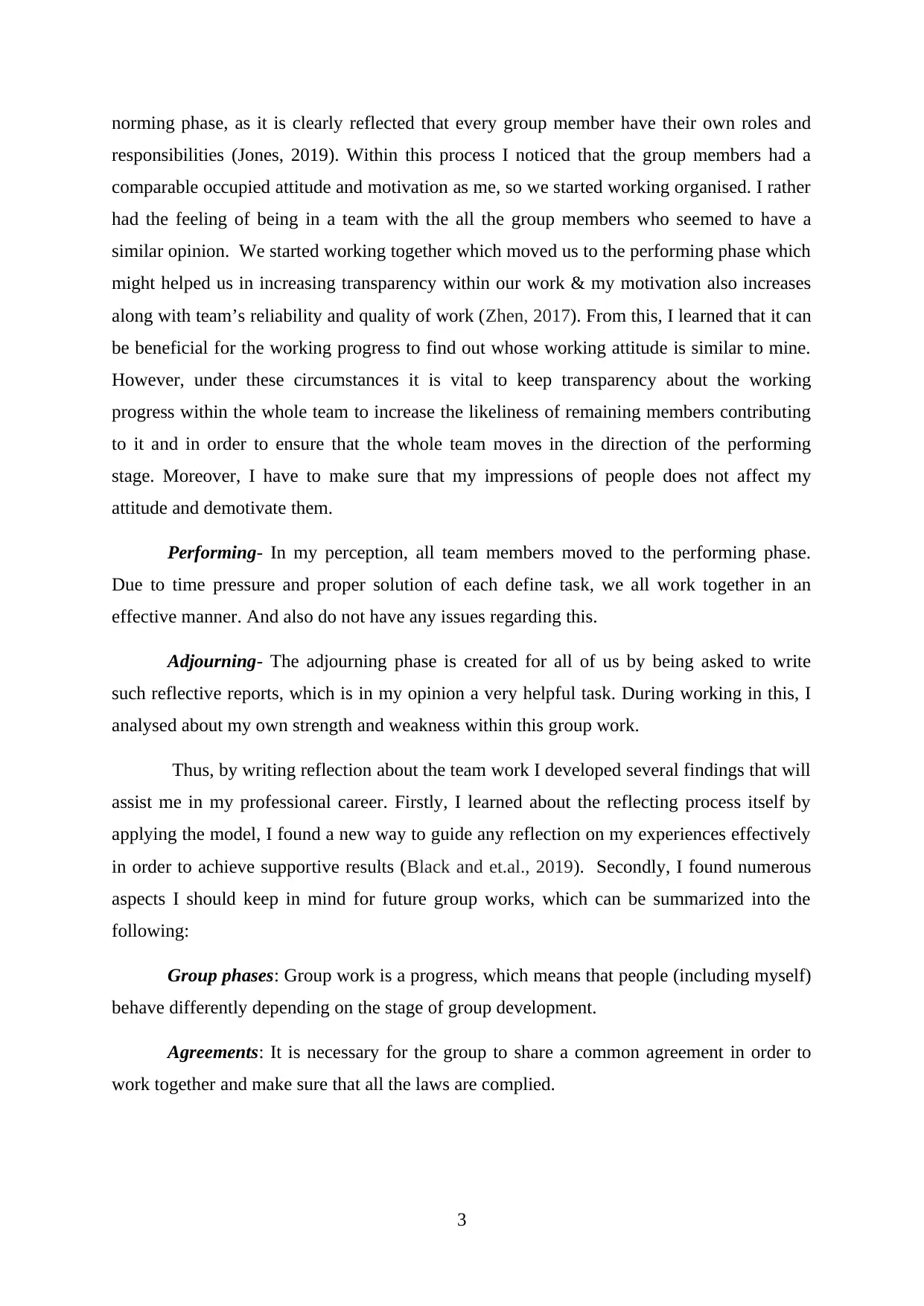
norming phase, as it is clearly reflected that every group member have their own roles and
responsibilities (Jones, 2019). Within this process I noticed that the group members had a
comparable occupied attitude and motivation as me, so we started working organised. I rather
had the feeling of being in a team with the all the group members who seemed to have a
similar opinion. We started working together which moved us to the performing phase which
might helped us in increasing transparency within our work & my motivation also increases
along with team’s reliability and quality of work (Zhen, 2017). From this, I learned that it can
be beneficial for the working progress to find out whose working attitude is similar to mine.
However, under these circumstances it is vital to keep transparency about the working
progress within the whole team to increase the likeliness of remaining members contributing
to it and in order to ensure that the whole team moves in the direction of the performing
stage. Moreover, I have to make sure that my impressions of people does not affect my
attitude and demotivate them.
Performing- In my perception, all team members moved to the performing phase.
Due to time pressure and proper solution of each define task, we all work together in an
effective manner. And also do not have any issues regarding this.
Adjourning- The adjourning phase is created for all of us by being asked to write
such reflective reports, which is in my opinion a very helpful task. During working in this, I
analysed about my own strength and weakness within this group work.
Thus, by writing reflection about the team work I developed several findings that will
assist me in my professional career. Firstly, I learned about the reflecting process itself by
applying the model, I found a new way to guide any reflection on my experiences effectively
in order to achieve supportive results (Black and et.al., 2019). Secondly, I found numerous
aspects I should keep in mind for future group works, which can be summarized into the
following:
Group phases: Group work is a progress, which means that people (including myself)
behave differently depending on the stage of group development.
Agreements: It is necessary for the group to share a common agreement in order to
work together and make sure that all the laws are complied.
3
responsibilities (Jones, 2019). Within this process I noticed that the group members had a
comparable occupied attitude and motivation as me, so we started working organised. I rather
had the feeling of being in a team with the all the group members who seemed to have a
similar opinion. We started working together which moved us to the performing phase which
might helped us in increasing transparency within our work & my motivation also increases
along with team’s reliability and quality of work (Zhen, 2017). From this, I learned that it can
be beneficial for the working progress to find out whose working attitude is similar to mine.
However, under these circumstances it is vital to keep transparency about the working
progress within the whole team to increase the likeliness of remaining members contributing
to it and in order to ensure that the whole team moves in the direction of the performing
stage. Moreover, I have to make sure that my impressions of people does not affect my
attitude and demotivate them.
Performing- In my perception, all team members moved to the performing phase.
Due to time pressure and proper solution of each define task, we all work together in an
effective manner. And also do not have any issues regarding this.
Adjourning- The adjourning phase is created for all of us by being asked to write
such reflective reports, which is in my opinion a very helpful task. During working in this, I
analysed about my own strength and weakness within this group work.
Thus, by writing reflection about the team work I developed several findings that will
assist me in my professional career. Firstly, I learned about the reflecting process itself by
applying the model, I found a new way to guide any reflection on my experiences effectively
in order to achieve supportive results (Black and et.al., 2019). Secondly, I found numerous
aspects I should keep in mind for future group works, which can be summarized into the
following:
Group phases: Group work is a progress, which means that people (including myself)
behave differently depending on the stage of group development.
Agreements: It is necessary for the group to share a common agreement in order to
work together and make sure that all the laws are complied.
3
⊘ This is a preview!⊘
Do you want full access?
Subscribe today to unlock all pages.

Trusted by 1+ million students worldwide
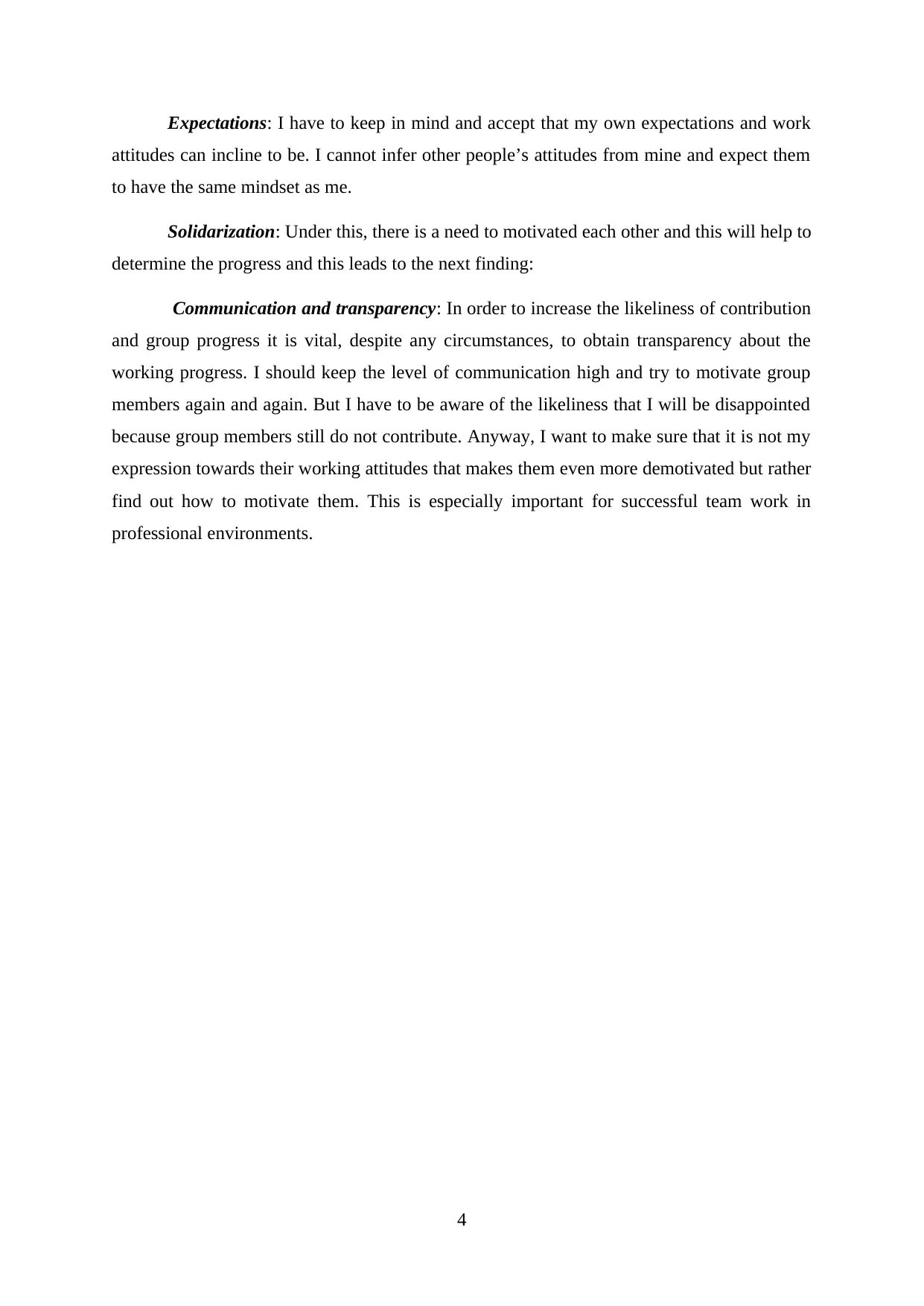
Expectations: I have to keep in mind and accept that my own expectations and work
attitudes can incline to be. I cannot infer other people’s attitudes from mine and expect them
to have the same mindset as me.
Solidarization: Under this, there is a need to motivated each other and this will help to
determine the progress and this leads to the next finding:
Communication and transparency: In order to increase the likeliness of contribution
and group progress it is vital, despite any circumstances, to obtain transparency about the
working progress. I should keep the level of communication high and try to motivate group
members again and again. But I have to be aware of the likeliness that I will be disappointed
because group members still do not contribute. Anyway, I want to make sure that it is not my
expression towards their working attitudes that makes them even more demotivated but rather
find out how to motivate them. This is especially important for successful team work in
professional environments.
4
attitudes can incline to be. I cannot infer other people’s attitudes from mine and expect them
to have the same mindset as me.
Solidarization: Under this, there is a need to motivated each other and this will help to
determine the progress and this leads to the next finding:
Communication and transparency: In order to increase the likeliness of contribution
and group progress it is vital, despite any circumstances, to obtain transparency about the
working progress. I should keep the level of communication high and try to motivate group
members again and again. But I have to be aware of the likeliness that I will be disappointed
because group members still do not contribute. Anyway, I want to make sure that it is not my
expression towards their working attitudes that makes them even more demotivated but rather
find out how to motivate them. This is especially important for successful team work in
professional environments.
4
Paraphrase This Document
Need a fresh take? Get an instant paraphrase of this document with our AI Paraphraser
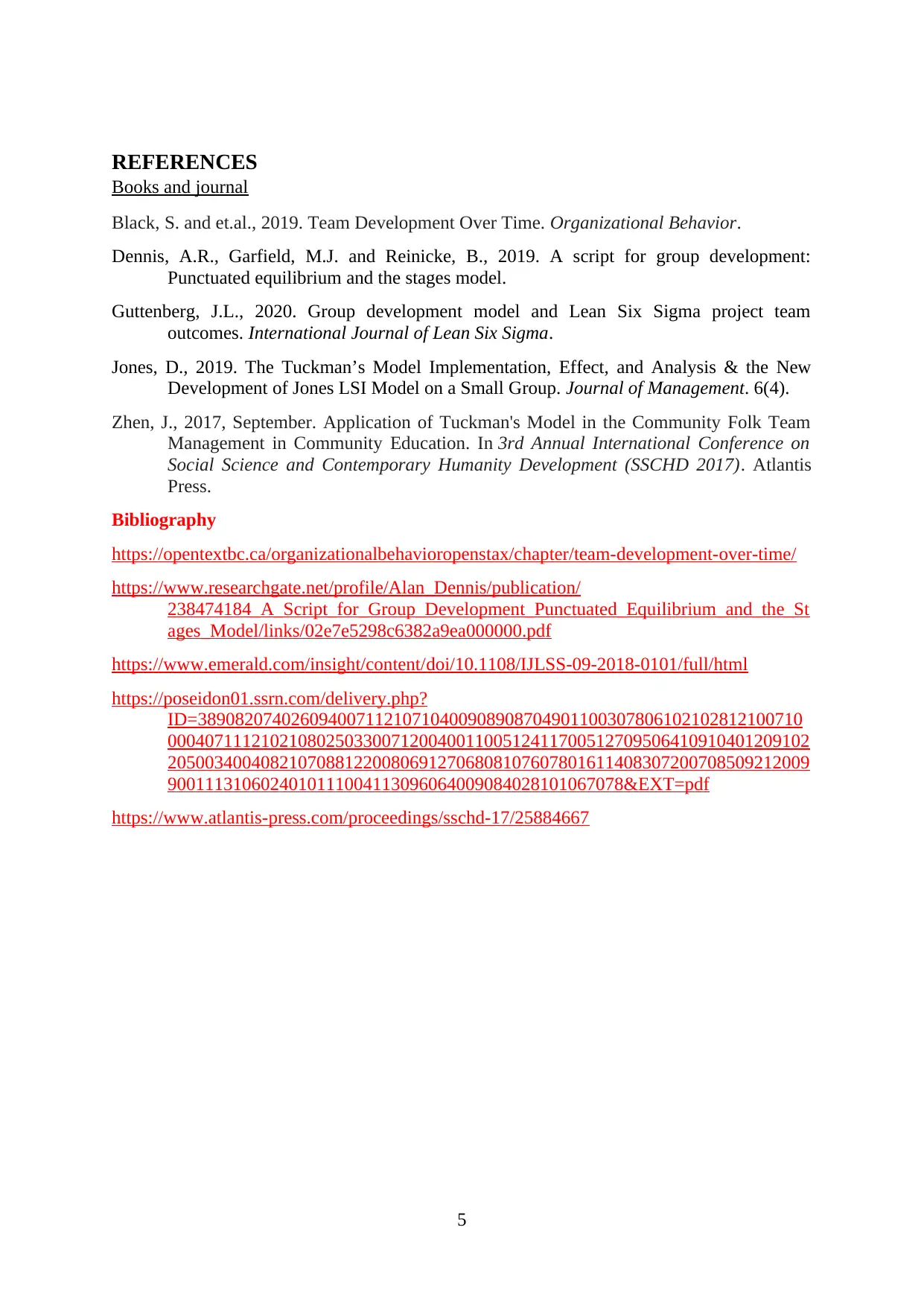
REFERENCES
Books and journal
Black, S. and et.al., 2019. Team Development Over Time. Organizational Behavior.
Dennis, A.R., Garfield, M.J. and Reinicke, B., 2019. A script for group development:
Punctuated equilibrium and the stages model.
Guttenberg, J.L., 2020. Group development model and Lean Six Sigma project team
outcomes. International Journal of Lean Six Sigma.
Jones, D., 2019. The Tuckman’s Model Implementation, Effect, and Analysis & the New
Development of Jones LSI Model on a Small Group. Journal of Management. 6(4).
Zhen, J., 2017, September. Application of Tuckman's Model in the Community Folk Team
Management in Community Education. In 3rd Annual International Conference on
Social Science and Contemporary Humanity Development (SSCHD 2017). Atlantis
Press.
Bibliography
https://opentextbc.ca/organizationalbehavioropenstax/chapter/team-development-over-time/
https://www.researchgate.net/profile/Alan_Dennis/publication/
238474184_A_Script_for_Group_Development_Punctuated_Equilibrium_and_the_St
ages_Model/links/02e7e5298c6382a9ea000000.pdf
https://www.emerald.com/insight/content/doi/10.1108/IJLSS-09-2018-0101/full/html
https://poseidon01.ssrn.com/delivery.php?
ID=38908207402609400711210710400908908704901100307806102102812100710
000407111210210802503300712004001100512411700512709506410910401209102
205003400408210708812200806912706808107607801611408307200708509212009
9001113106024010111004113096064009084028101067078&EXT=pdf
https://www.atlantis-press.com/proceedings/sschd-17/25884667
5
Books and journal
Black, S. and et.al., 2019. Team Development Over Time. Organizational Behavior.
Dennis, A.R., Garfield, M.J. and Reinicke, B., 2019. A script for group development:
Punctuated equilibrium and the stages model.
Guttenberg, J.L., 2020. Group development model and Lean Six Sigma project team
outcomes. International Journal of Lean Six Sigma.
Jones, D., 2019. The Tuckman’s Model Implementation, Effect, and Analysis & the New
Development of Jones LSI Model on a Small Group. Journal of Management. 6(4).
Zhen, J., 2017, September. Application of Tuckman's Model in the Community Folk Team
Management in Community Education. In 3rd Annual International Conference on
Social Science and Contemporary Humanity Development (SSCHD 2017). Atlantis
Press.
Bibliography
https://opentextbc.ca/organizationalbehavioropenstax/chapter/team-development-over-time/
https://www.researchgate.net/profile/Alan_Dennis/publication/
238474184_A_Script_for_Group_Development_Punctuated_Equilibrium_and_the_St
ages_Model/links/02e7e5298c6382a9ea000000.pdf
https://www.emerald.com/insight/content/doi/10.1108/IJLSS-09-2018-0101/full/html
https://poseidon01.ssrn.com/delivery.php?
ID=38908207402609400711210710400908908704901100307806102102812100710
000407111210210802503300712004001100512411700512709506410910401209102
205003400408210708812200806912706808107607801611408307200708509212009
9001113106024010111004113096064009084028101067078&EXT=pdf
https://www.atlantis-press.com/proceedings/sschd-17/25884667
5
1 out of 5
Related Documents
Your All-in-One AI-Powered Toolkit for Academic Success.
+13062052269
info@desklib.com
Available 24*7 on WhatsApp / Email
![[object Object]](/_next/static/media/star-bottom.7253800d.svg)
Unlock your academic potential
Copyright © 2020–2026 A2Z Services. All Rights Reserved. Developed and managed by ZUCOL.





